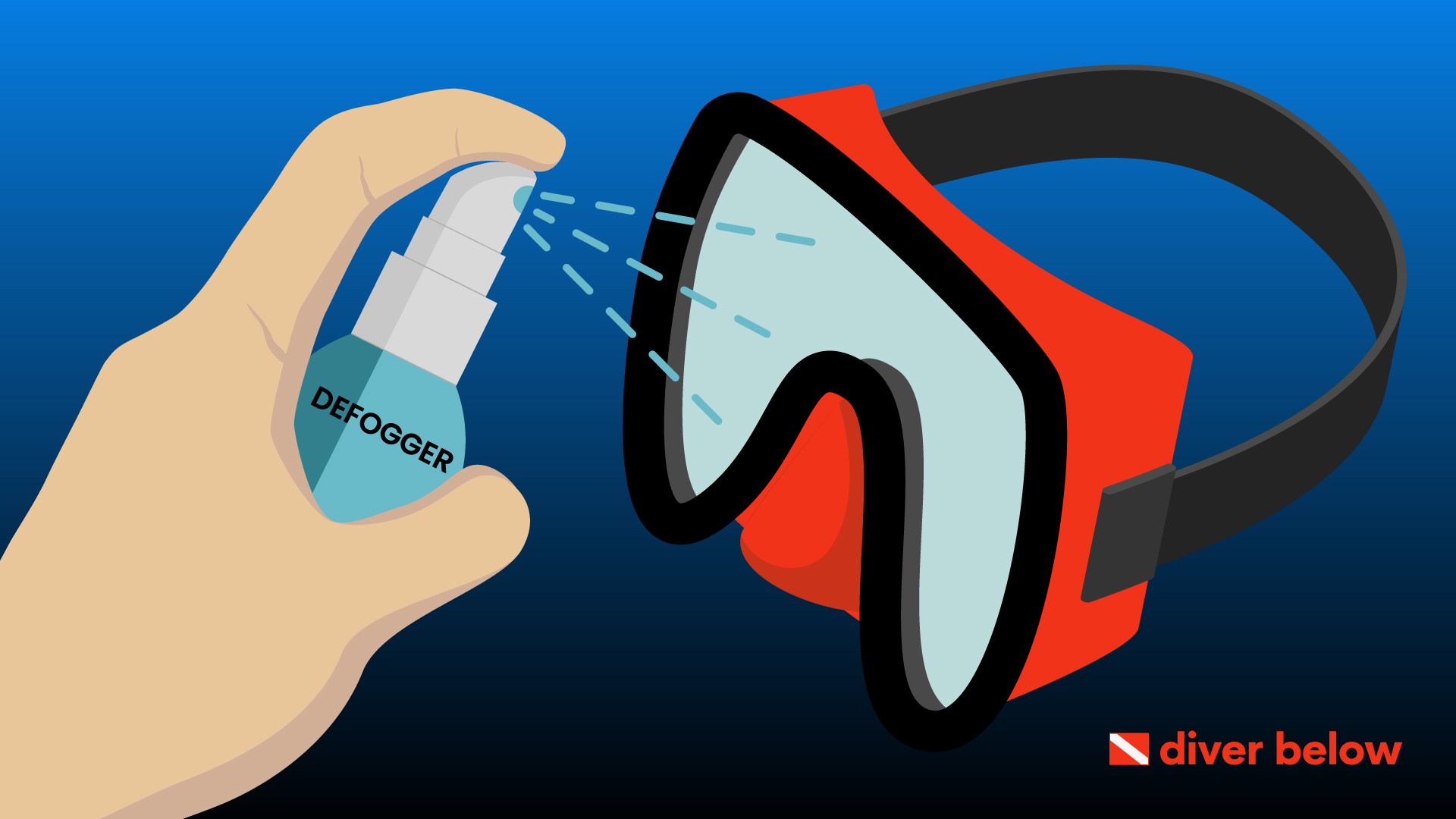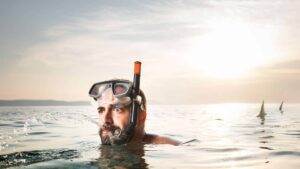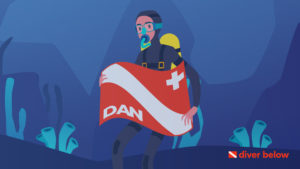When diving, the ear sits in a unique position of being open to external and internal injuries.
Because of its role in regulating balance and pressure, the inner ear can be harmed by the pressure caused by deep dives.
But, what exactly causes diver’s ear. Is there any way to prevent or treat the condition?
Here’s what you should know about diver’s ear before taking your next dive into the depths.
Contents
- What Is Diver’s Ear Pain?
- What Causes Ear Pain from Diving?
- When Does This Pain Occur?
- Why Does This Pain Occur?
- What Are the Symptoms of Ear Pain for Diving?
- How Long Does Pain from Diver’s Ear Usually Last?
- Do Divers Normally Have Ear Problems from Diving?
- How to Treat Divers Ear Pain from Diving
- When to Seek Medical Help for Ear Pain from Diving
- Wrapping Up
What Is Diver’s Ear Pain?
Diver’s ear pain is a feeling of pressure or squeezing inside the ear.
It happens when a diver goes deeper than the structures in the ear can handle, causing a painful sensation in the ear.
This pain is a sign the diver has gone too deep into the water for their ears to handle.
What Causes Ear Pain from Diving?
The source of pain that you get in your ear when diving is called ear barotrauma.
Also known as an ear squeeze, this is a clogged up potentially painful feeling in your ears due to rapid air pressure changes.
In addition to diving, things like altitude changes when flying or driving in the mountains can cause ear barotrauma.
As you descend into the water, the water pressure coming from the ocean around you increases.
This puts extra pressure on the eardrum, also called the tympanic membrane.
The eardrum is what separates the outer and middle ear.
This pressure has to be equalized by the body to prevent the eardrum from rupturing.
To do that, a structure that connects your ear and nose called the eustachian tube opens up.
The air passing through the eustachian tube enters the middle ear, pushing back against the eardrum and evening out the surface pressure on the membrane.
If this pressure can’t be equalized, then the pressure on the eardrum increases, pushing it back into the ear.
With enough pressure, this can feel like someone is pressing something into your ear canal, causing ear pain and, if ignored, ear injury.
When Does This Pain Occur?
Diver’s ear pain comes during the descent of a dive.
As the water pressure builds up around the diver, they begin to experience ear barotrauma.
This barotrauma, which feels like a pressure or squeezing in the ear, can range from uncomfortable to painful depending on the water pressure placed on the middle ear.
If this pressure is ignored and the diver continues their descent, the pressure can rupture the eardrum.
While this will relieve the pressure in the ear, it can cause damage to the middle ear and inner ear as water flows into these structures.
Symptoms like nausea, vomiting, and vertigo are common as well.
Why Does This Pain Occur?
The pain itself comes from the eardrum having excess pressure placed on it that the middle ear and ear tubes can’t compensate for.
However, there are some conditions or habits that can increase the chances that your Eustachian tubes can’t open enough to relieve the barotrauma:
- Clogged sinuses: Mucus can create blockages in the body’s sinuses and the eustachian tubes, preventing air from entering the middle ear during descent.
- Allergies: Allergies can cause a diver to create a buildup of mucus or inflammation in their sinuses, preventing air from moving around when diving.
- Tobacco use: Tobacco use can increase inflammation in the mouth and throat, closing off the eustachian tubes and preventing the body from evening out the pressure.
- The size/shape of your ear canal: Some ear canals are shaped in a way that prevents the easy flow of air and pressure through the sinuses.
In general, it is best to avoid going diving if you are a heavy smoker or have conditions that would cause head congestion.
These factors do not mean that you will get diver’s ear, but they increase your chances.
[gw_video url=”https://www.youtube.com/watch?v=D31snubWga0″]
What Are the Symptoms of Ear Pain for Diving?
The pressure put against the eardrum is the cause for the pain and other symptoms caused by diver’s ear.
The high pressure of the water around the diver forces the eardrum to bulge inwards, creating the painful, squeezing feeling inside the ear.
The worst-case scenario is if the eardrum ruptures.
When this happens, water can rush into the ear, causing several problems:
- Nausea: Because the inner ear is responsible for our sense of balance, a ruptured eardrum can cause feelings of sickness.
- Vomiting: If nausea gets too intense, your body may respond by vomiting to try and clear the nauseous feeling.
- Vertigo: Our sense of balance is partly made in the ears, which can be affected when the eardrum bursts,
- Fluid draining: The water that rushes into the ear when the eardrum bursts will drain out once you exit the water,
- Facial paralysis: Partial facial paralysis on the side of the face where the rear drum ruptured can occur after surfacing.
If you feel any of these symptoms after a sudden relief of pressure in your ear when diving, you most likely ruptured your eardrum.
How Long Does Pain from Diver’s Ear Usually Last?
The pain and discomfort caused by ear barotrauma usually last as long as the pressure on the eardrum.
If the diver can get away from the increased pressure by safely rising to the surface, the pain caused by the barotrauma will fade soon after surfacing.
Still, safely rising is the primary concern.
To prevent decompression sickness, the diver should do what they can to rise to the surface without upsetting the gases in their body.
A dive computer can tell a diver what intervals they can safely climb out of the water at without causing further damage to their ear or themselves.
Do Divers Normally Have Ear Problems from Diving?
Ear problems caused by diving are rare.
Generally, divers can handle the depths that they explore with little to no trouble.
Still, there are a couple of conditions to watch out for when diving that can be caused by careless behavior:
- Inner ear decompression sickness: This is caused by gases in the inner gas building up and causing damage to hearing structures in the ear during ascent.
- Inner ear barotrauma: A sudden shift in inner ear pressure can cause a movement called the Valsalva maneuver that injures the inner ear and causes hearing damage.
How to Treat Divers Ear Pain from Diving
Treating diver’s ear is challenging because it is only there while the pressure from the water is on your eardrum.
However, there are a few things you can do to reduce your chances that divers ear will affect you:
Common Remedies to Fix Ear Pressure
Because the pressure in your ear from ear barotrauma comes from a closed eustachian tube or excess pressure, remedies for this will need to open up the Eustachian tubes in your head.
Here are some of the common household remedies to relieve ear pressure:
- Inhaling steam: Steam carries a lot of heat that opens up the eustachian tubes to clear the feeling of blocked ears.
- Saline nasal washes: Nasal washes can remove physical blockages from the tubes caused by mucus.
- Warm compresses: Much like steam, a warm compress can apply heat to the sinuses from the outside, opening up tubes and clearing blockages.
- Medications: Antihistamines and antibiotics can help clear the symptoms of allergies and infections that would block sinuses and the eustachian tubes.
Common Remedies to Fix Diver’s Ear (Not Related to Ear Pressure)
The only thing that fixes diver’s ear is to go back to the surface.
However, there are a few things you should remember when making your ascent:
Stop your dive: Rather than going deeper into the water, a diver with pain in their ear should start a careful ascent back to the surface.
Rely on your diving partner: If you feel a rupture, rely on your diving partner to guide up back up safely and keep any panic you feel in check.
Keep the ear dry after surfacing: To prevent infection, the outer ear should be kept dry so more water can’t enter the middle ear and inner ear.
When to Seek Medical Help for Ear Pain from Diving
Most of the time, ear pain will be the sign that a diver needs to stop their dive.
If the diver heeds this warning, the symptoms should resolve once they reach the water’s surface and the pressure around the eardrum normalizes.
If the diver begins to feel nauseous, begins to vomit, or has hearing loss, they should seek medical help.
Those symptoms can signify that the eardrum has ruptured, which requires medical help to fix and treat.
In most cases, a diver won’t need to take an ambulance to the hospital.
However, they should be directed to the Emergency Department.
An ear infection is possible with a ruptured eardrum since it allows bacteria to grow and multiply inside the ear.
Wrapping Up
Diver’s ear happens when a diver goes deeper than his eardrum can take.
If this pain isn’t used as a sign to begin to ascend, then damage to the ear can happen when the eardrum ruptures.
The best ways to prevent this from happening are to clear any congestion in the head and ensure that proper safety measures are taken, such as diving with a partner.





